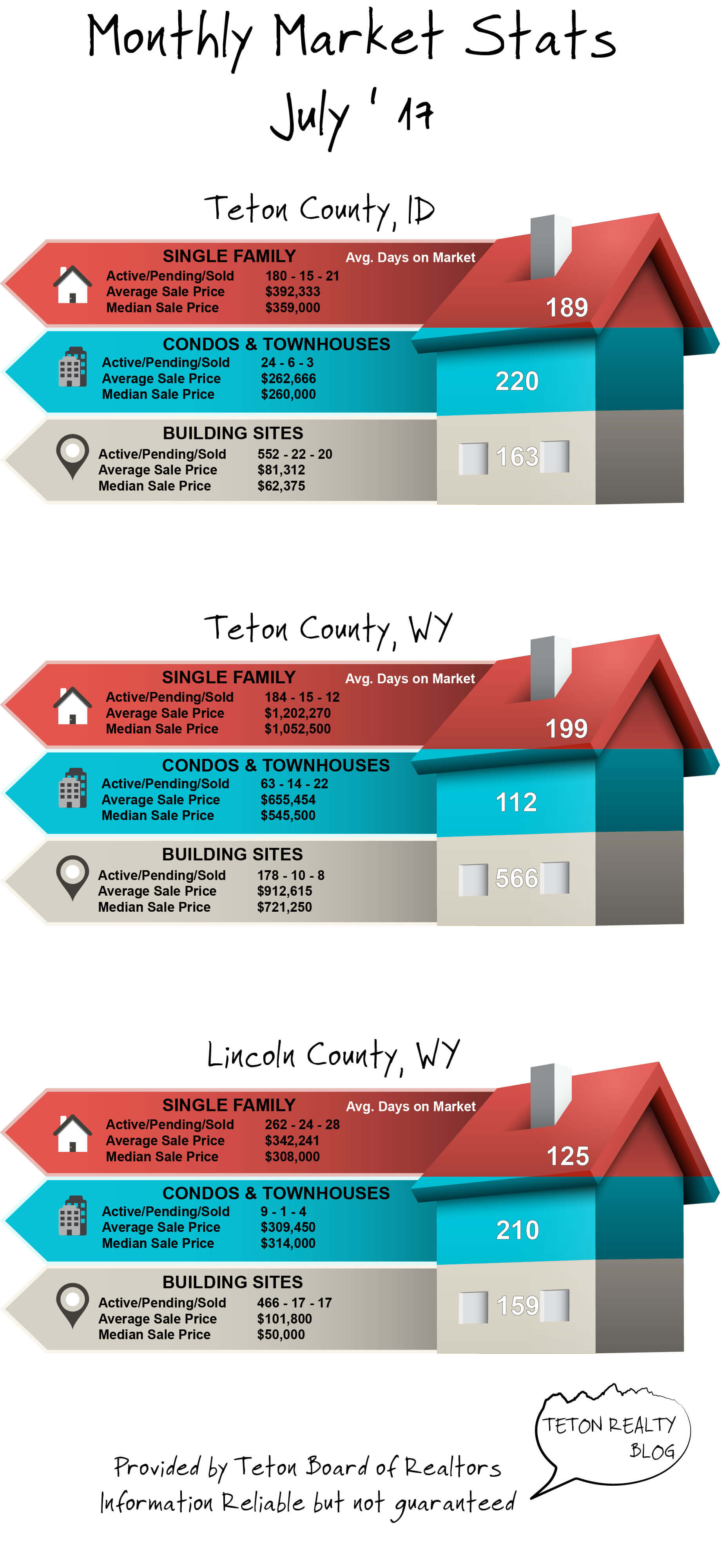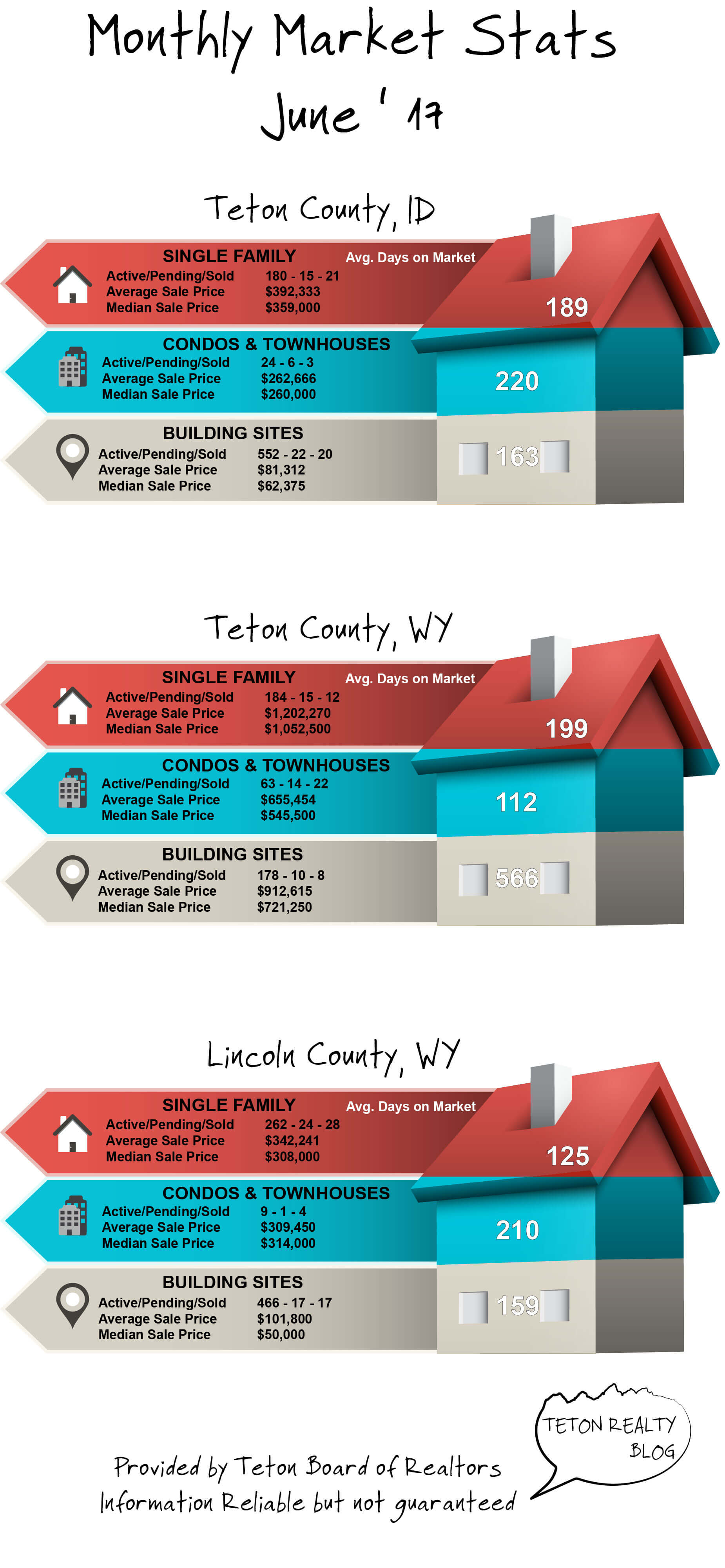
July ’17 Market Stats

Teton Region Real Estate Market Stats, Articles & News

 I think there are a couple of important elements associated with this question.
I think there are a couple of important elements associated with this question.
1) the online effect – AKA eBay
2) the for-sale-by-owner effect
3) government regulations
4) convenience
5) local understanding and expertise
6) market trends
Alright – in no particular order:
I’m going to go after local understanding and expertise as well as market trends first. If you have researched this topic online, there are arguments on both sides of the field. Obviously, most real estate agents would argue that their service is needed, and the real estate agent will never become obsolete. If you have a burning hatred for real estate agents (some people do) the information sways the opposite direction. With regards to these two elements, I think there are arguments on both sides of the fence. Starting with market trends, I believe that market trend information is available to those who are not market professionals, it is just a matter of whether that person is able to interpret the information and take the time to research it. With regards to this argument, I think it comes down to whether or not you want to spend the time researching it, or rely on a local professional. As long as it’s someone you can trust, I would personally choose the agent in this regard, but it doesn’t mean everybody should. I personally have better things to do, and frankly don’t have the time to take on any further responsibility or research. Local expertise, however, is something that only exists if you are a local. Presumably, real estate agents our local experts in their local market. I think this can also go both ways. If you are local, you understand local construction methods, background, and history, you might not need an agent for this particular element. If you aren’t local, a good agent is indispensable in this regard.
I touched on convenience a bit with regards to time. Whether it’s something you don’t want to take on because you’re busy making money doing what you do, perhaps you are retired and would rather leave the paperwork to the professional, or maybe you just aren’t experienced and don’t want to take on the liability and responsibility associated with negotiating a real estate transaction, I think there will always be an audience that will work with an agent for these reasons alone. Here again, it doesn’t mean they have to.
Government regulations have always been the “Ace in the Hole” for most arguments I read in favor of the agent never going away. Governments protect consumers with regards to professionals in many ways that you may not realize. For example, an esthetician or hair stylist is required to take the number of education courses to maintain their license to conduct business. Further, they are required to uphold a lifestyle free of unlawful activities, and in many cases they are required to complete ongoing education classes. Real estate licenses are no different, and most governments monitor real estate activities very closely, especially when it comes to protecting the public which is the primary goal. With this comes several requirements including disclosures with regards to agency and real estate itself. Sellers are required (in most cases) to disclose pertinent information about the property being sold, and the agent acts as a liaison to properly communicate this information to any prospective buyer. It’s not just a rubber stamp or signature either. Real estate agents are trained to specifically communicate all elements of real estate to any potential buyer or seller in ways that they can clearly understand, not just signing off on a document that may not be communicated properly. For these reasons, the industry is very intertwined with government regulation, and in many cases they intend to keep it that way. There’s another effect that is closely related to the industry when it comes to other practices historically completed by a professional. Uber and Airbnb are good examples. Trusting some guy with a Honda Civic to take you from Joe’s Seafood Palace to taking your chances on a place to sleep near downtown is a bit different than purchasing a home, but the analogy is still one that comes up frequently.
The last paragraph lends itself to the biggest opportunity for a major shake-up in the industry. That is online retail. This is an area where many sales outlets or even representatives have, or are, becoming obsolete. There are very few things in this world apart from a [new] quality Stihl chainsaw or a Kirby vacuum cleaner that cannot be purchased online. People buy cars and real estate without the help of a professional or even a human online. Online Auctions are a good example. However, While most people are comfortable buying a used camera online and willing to take the risk that the battery isn’t fried, it’s a bit different, again, for most people when comparing the $18.64 camera to the biggest investment of their lives.
So. If you are a savvy investor familiar with local markets and have done your due diligence with regards to local market trends, are comfortable making a major purchase without any human interaction, can find a property of interest of which the owner of said property is not already represented by a professional, is also a local expert familiar with market trends and comfortable selling a property without the assistance of a professional, I would advise the both of you save a few thousand bucks and complete the transaction.
Reports are coming out a bit late for Teton Valley, Jackson & Star Valley, see below:


It’s funny that I reference art in the same sentence as something that I’m not very good at. That is, the referral.
Oftentimes agents refer to the customers they are working for with different names. The one that gets me is “the client”. Agents will refer to the person they are working with as their client, regardless of whether or not the person may or may not actually be his or her client… “Oh yes, that’s Bob, he’s my client.” Sometimes I wonder if it’s a protective measure for real estate agents marking their territory when speaking to other agents about a person that might be working with either, or both…
I’ve gone way off track here. When it comes to making money in the real estate industry, we usually do so by providing a service within a State of which we are licensed. There is one exception, the referral. If I have “a client” working with me in Idaho or Wyoming, and they decide they would rather purchase in Arizona, they can do their homework and choose
an agent to work with in that State. OR, an agent the client knows or is comfortable with can vet out agents in Arizona and refer them to the agent in Arizona. When doing so, they would ask the Arizona agent for compensation in return for the referral, but usually only if the client completes the purchase in Arizona. In most cases, the agent in Arizona, or the receiving agent will compensate the broker who provided the referral a portion of the compensation they receive. It doesn’t cost the client anything.
While a referral is more accurately described as an act of referring someone for a specific service, you can now see in the real estate industry a referral often time represents a person such as a client or a customer.
So why aren’t I good at referrals? I don’t suppose it’s something that one can really be bad at, I just feel that sometimes it’s not appropriate. With regards to the
circumstance above, sure. There are however a number of agents who ask for referrals when in my opinion, it isn’t appropriate. For example, advertising real estate in an area you are not familiar with then simply referring the client to a local professional is not appropriate in most circumstances, at least in my opinion. There are unfortunately a number of brokerages whose services are dedicated to this sort of tactic. Usually a website will funnel potential buyers and sellers into a location where they receive a recommendation for an agent, even though they know nothing about the agent they are referring. In some cases the receiving agent might just be paying for the service. In this scenario, there’s no research going into the recommendation. Another example would be real estate agents themselves. Real estate agents are notorious for shopping for real estate in areas where they are not licensed, locating an agent, and asking for a referral fee when the transaction closes. I’m probably going to get some flak for this, but in many circumstances I don’t think it’s appropriate.
I believe agents need to be transparent when working with other professionals. If they expect a fee, they need to make that clear before enlisting the services of another professional.
A final note about referrals, they are ONLY paid by brokers to those with a real estate license. Agents can NOT compensate anyone directly, and Brokers can NOT compensate someone who does not hold a real estate license.
So, maybe I just need to get better about asking for a referral. Remember it’s not all about asking another agent for a fee, but it’s broaching the issue with the potential client. The referral can be a useful tool, and a helpful service to the public, as long as they are aware of the situation. I think it would be relatively difficult to refer someone to another agent without them being aware of the situation. So, how would you feel if your agent asked if they could locate another agent for you in hopes of receiving a fee from the receiving agent?